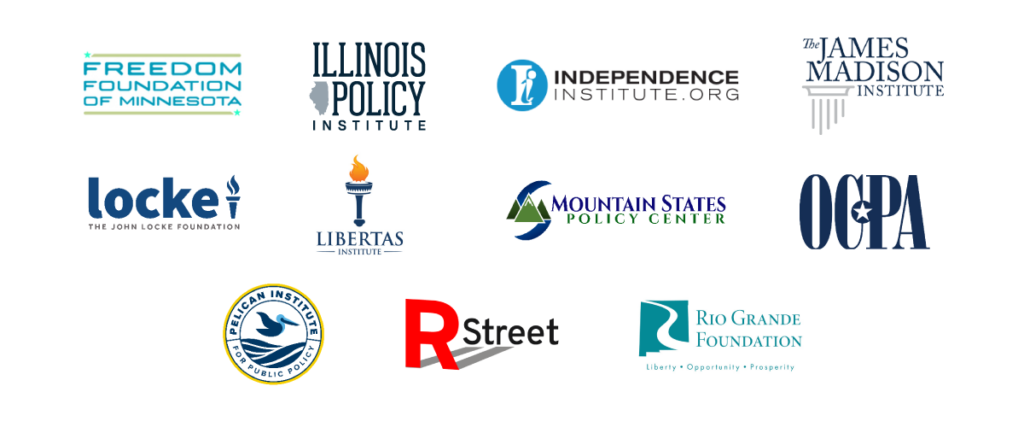CGO Amicus Curiae Brief Filed in NetChoice v. Paxton and Moody v. NetChoice
Executive Summary
The Center for Growth and Opportunity, joined by a group of state-based think tanks and policy organizations, filed an amicus brief in two related Supreme Court cases: NetChoice v. Paxton and Moody v. NetChoice.
What are NetChoice v. Paxton and Moody v. NetChoice about?
The question at hand
Do the provisions in Texas HB 20 and Florida S.B. 7072, which seek to restrict social media platforms from censoring content based on viewpoints and impose disclosure and moderation requirements, violate the First Amendment’s protection of editorial decisions and free expression on websites?
Details of the case
On May 24, 2021 Florida bill SB 7072 was passed into law. This bill sought to address perceived bias and censorship against conservative voices on social media by imposing restrictions on social media platforms, specifically targeting those with substantial revenues or large user bases. The law includes measures like banning deplatforming of political candidates and requiring detailed content moderation policy disclosures. NetChoice, a trade organization representing tech companies, challenged the law, asserting that the law’s provisions violated the First Amendment and were preempted by federal law, specifically invoking Section 230. The district court granted a preliminary injunction, relying on potential conflict with Section 230 and likely First Amendment violations. The U.S. Court of Appeals for the Eleventh Circuit upheld these findings. Florida appealed to the Supreme Court.
Meanwhile, on September 9, Texas passed into law HB 20, a bill similarly meant to regulate the content moderation decisions on major social media platforms, including Facebook, X (formerly Twitter), and YouTube. The law’s intent was to prevent viewpoint-based content censorship and impose content moderation disclosure requirements. NetChoice challenged two provisions in the law: Section 7, which prohibited viewpoint-based censorship with exceptions for illegal content, and Section 2, which mandated disclosure of content moderation practices and an appeal system. The district court issued a preliminary injunction, finding Section 7 and Section 2 unconstitutional, arguing that social media platforms possess editorial discretion protected by the First Amendment. However, the U.S. Court of Appeals for the Fifth Circuit reversed this decision, contending that HB 20 primarily aimed to protect others’ speech and regulate platform conduct. NetChoice appealed.
With the Circuit Courts deciding different outcomes on similar laws, the Supreme Court granted cert and oral arguments are set to take place in early 2024.
What is at stake in this case?
Crucial free speech and platform regulation issues are at stake. As we argued in our Gonzalez v. Google brief, if the Court decides against NetChoice, marginalized, conservative voices will be diminished and U.S. economic growth slowed.
- If the Court upholds these laws, then the United States’s national free-speech marketplace will be balkanized into 50+ regimes with varying and conflicting government regulation of online speech.
- In some jurisdictions, social media sites could be forced to host unsavory speech and opinions coarsening the social media experience for the majority of users.
- In other jurisdictions, state and local governments could be emboldened to further manipulate social media platform content to promote ideological allies and suppress opponents’ ideas.
- These laws could further entrench the largest social media companies and limit smaller competitors. Big companies are the only ones that would have the resources to comply with dozens of state laws.
These cases have significant implications for how states can regulate major social media platforms, directly affecting digital communication and expression.
What arguments does this amicus brief make?
The Constitution calls for a national free-speech marketplace, which will be constricted by a hodgepodge of conflicting state speech codes.
- Since passage of the Fourteenth Amendment, the First Amendment has required the free flow of competing ideas nationwide, unhindered by state protectionism.
- Conflicting state speech codes will artificially protect ideas from healthy competition and further balkanize the Country into populations with opposing visions of reality.
A free marketplace of ideas is best fostered—and is already being fostered—by normal market forces
- The Court in Packingham urged “extreme caution” before upsetting the internet’s status quo. Such caution is warranted because the internet is new and quickly changing, and because content moderation decisions are expressive speech, even when made by algorithms.
- The internet’s status quo is one of fierce competition and few gatekeepers compared to traditional media. Conservative and heterodox voices have had great success online, including on the major platforms.
- Assuming that state governments must regulate “Big Tech” ignores that no one has ever ruled Big Tech for long, and creative destruction is changing Big Tech today.
- “Big Tech” titans endlessly rise and fall. Consider that Twitter, which the Fifth Circuit christened a “monopoly,” no longer exists; it has been sold and recast as a free-speech zone called “X.”
Signatories
Click “Download PDF” under “Resources” to the top right to read the amicus curiae in full.

